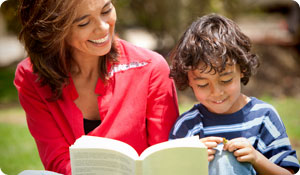
Playing hide and seek isn't just fun for young children, it's good for their brains!
That's because interactive play stimulates neurons (brain cells) which fosters the best possible cognitive development.
According to the American Academy of Pediatrics (AAP) play is so important that in 2006 it was recognized by the United Nations High Commission for Human Rights as a right of every child.
Cognition is the brain's ability to think. Neena Malik, Ph.D., child and family clinical psychologist at the University of Miami, says children between the ages of 1 and 3 develop language skills, social awareness and reasoning abilities. "At a young age, cognitive development is the result of listening, watching, and touching," the expert says.
Though toddlers develop cognitively at a faster pace than infants, brain development is an ongoing process that begins before birth. At five months gestation, 100 billion neurons (brain cells) have already been formed. A newborn's brain is only about one-quarter the size of an adult's. The brain grows to 80 percent of adult size by three years of age and reaches 90 percent of its adult size by the age of five.
Talk
Language is fundamental to most of the rest of cognitive development. When it comes to learning how to communicate, Malik says the importance of social interaction cannot be overstated.
"Social interaction between a child and a caring adult is the only way children get language so it's crucial," says the expert. "Children need language spoken to them constantly in order to understand emotion, appreciate inflections and to get the experience of shared meaning. There's just no other way to do it."
According to Zero to Three, a national non-profit group that supports the health and development of infants and toddlers, the critical period for language-learning begins to close around five years of age and ends around puberty. This is why individuals who learn a new language after puberty almost always speak it with a foreign accent. Most toddlers master 50 words by the end of their second year and can talk in sentences.
Play
Yes, it's important to observe, listen, and interact with your child but special computer programs or games designed to turn your baby into a rocket scientist before she completes kindergarten aren't necessary. Normal, loving, and responsive care giving provides children the best route to learning-through their own exploration.
Here, some ideas to help you make the most of their playtime:
- Read a book. Whenever you read to your child, you are modeling language.
- Make the experience more interactive by asking simple questions.
- Have him point out something like the brown dog in the picture.
Sort it Out. Sorting games encourage recognition and reasoning. Sort by color, size, texture, or any other category (for example, a collection of stuffed cats can be arranged by size or color).
Click and Learn. From interactive peek-a-boo to games that focus on a combination of colors, sounds and motion, today there are endless online ways to stimulate your child's senses and challenge her with cognitive tasks.
But many computer learning games don't involve much more than hitting a letter or the space bar. Babygamer.com is free and was created by parents for parents. Show your child how to play the Night Animals game. Your child will squeal with delight when she clicks on the "light" and sees two neon yellow circles (against a black background) transform into the eyes of a wise owl. (Editor's note: Exercise caution with allowing young children on line. Many become over stimulated when playing on the computer. Fifteen minutes at a time is sufficient for most children under 3.)
Make a Mini Me. Outline your child's body by tracing around him on a large piece of paper (he'll likely be impressed with his one-dimensional self). Point out body parts and have your child name each one. A young child will enjoy seeing the one-dimensional version of himself and the game will expand his vocabulary and exercise his language skills.
Brown Bag it. Hide some small items in a paper bag. Anything that will fit into their little hands will do (pocket change, cotton balls, toy cars, etc.). Toddlers love the surprise of reaching into a bag for an unknown item. As she pulls out the items, help her count them aloud. The fun, tactile approach will help her remember the numbers and learn number sequences.
Sources:
Zero to Three
The role of parenting in brain development
http://www.zerotothree.org/
Wired Science, March 30, 2009
http://www.wired.com/wiredscience/2009/03/poordevelopment/
Interview with Neena Malik, Ph.D., child and family psychologist and scientist at the University of Miami
AAP (The American Academy of Pediatrics)
The Importance of Play in Promoting Healthy Child Development and Maintaining Strong Parent-Child Bonds
By Kenneth R. Ginsburg, MD, MSEd and the Committee on Communications and the Committee on Psychosocial Aspects of Child and Family Health
http://aappolicy.aappublications.org/cgi/content/full/pediatrics;119/1/182





